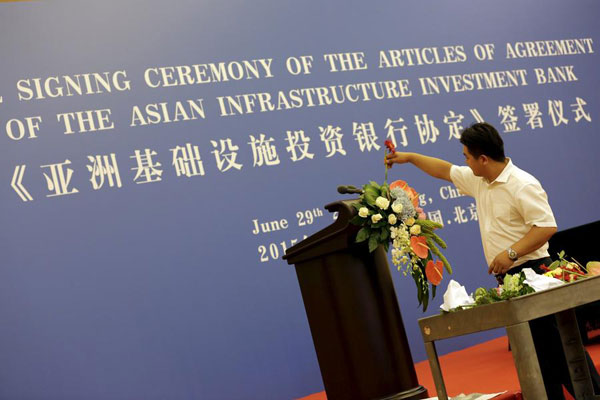 |
| A worker decorates a lectern for a signing ceremony of articles of agreement of the Asian Infrastructure Investment Bank (AIIB), at the Great Hall of the People in Beijing, June 29, 2015. [Photo/Agencies] |
Mobilizing finance for infrastructure in Asia is a critical need. In 2009, the Asia Development Bank estimated that Asian countries would require approximately $8 trillion in infrastructure investment from 2010 to 2020 if they are to maintain current levels of economic growth, but warned that there would only be limited funding for this available. With its authorised capital already estimated to have reached nearly US$100 billion, the recently-launched Asian Infrastructure Investment Bank, which has the support of all the members of the Association of Southeast Asian Nations and BRICS, as well as most G20 countries, among others, is in a position to make a significant contribution toward closing the financing gap and thus promoting Asian economic development.
To ensure its investments will not only support growth but also directly benefit – and bring no harm – to developing countries and people living in poverty, the AIIB has recently issued a draft Environmental and Social Framework. The ESF is open for public consultation until the end of this week.
Establishing an ESF is definitely a step in the right direction. Environmental and social safeguard policies have traditionally been treated as risk mitigation approaches by investors. However, there is growing recognition that sound environmental and social practices are crucial for successful investments and long-term sustainable project outcomes.
But to make the ESF consultation process and outcome a success, the AIIB should take further steps. First, it should further expand the consultation process to include face-to-face meetings between its management and stakeholders, especially civil society organisations, communities and the representatives of indigenous peoples. It should also translate the draft into key languages that have been identified by stakeholders, and include drafts of the operational procedures in the consultation.
Second, while the inclusion of a standard on involuntary resettlement in the ESF draft is welcome, it should also explicitly include the objective to strengthen, secure and prioritise the tenure rights of vulnerable and marginalised people. Furthermore, it should promote more equitable use of, access to and control over land, housing and natural resources, with particular attention paid to the rights of women.
Third, the AIIB should recognise the definition of free, prior and informed consent as enshrined in the United Nations Declaration on the Rights of Indigenous Peoples. Before the ESF is finalised, it is essential that meaningful consultation takes place with the representatives of indigenous peoples on the requirements relating to prior and informed consent.
Additionally, the AIIB should make mandatory environmental and social impact assessments for both high and medium risk projects, and provide criteria and examples of these projects. It should also include requirements in the ESF to screen proposed projects for adverse impacts on food security.
Moreover, the AIIB should commit to due diligence, monitoring and supervision measures of high-risk sub-projects financed through third parties. The ESF should state explicitly that the AIIB’s social and environmental policies will apply to sub-projects financed through financial intermediaries, like banks or private equity funds. The ESF must make clear the respective responsibilities of the bank and the client in monitoring and supervising projects that use clients’ systems in part or in whole. The bank should also seek third party (including civil society) verification in the monitoring of projects that use clients’ systems, particularly when using those of a corporate client.
Last but not least, given that it is ultimately the AIIB’s financing that will be used for a project regardless of the systems used, there should be an explicit provision in the ESF which allows communities who believe they have been harmed as a result of an AIIB-financed project to access and seek redress through a grievance mechanism. The bank should seek public comments on the plans for a grievance mechanism before finalising the ESF to ensure that from the start of its operations, affected communities have the opportunity to raise grievances – both to ensure redress, but also to help institutions learn from their mistakes.
The author is the manager of Oxfam’s China and the Developing World Programme.

I’ve lived in China for quite a considerable time including my graduate school years, travelled and worked in a few cities and still choose my destination taking into consideration the density of smog or PM2.5 particulate matter in the region.